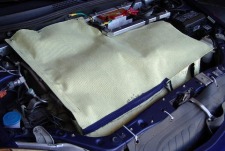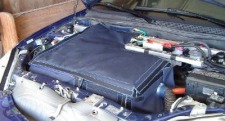 11-20-2008, 01:37 AM
11-20-2008, 01:37 AM
|
#31 (permalink)
|
|
(:
Join Date: Jan 2008
Location: up north
Posts: 12,762
Thanks: 1,585
Thanked 3,556 Times in 2,218 Posts
|
I'm too far away.
|
|
|

|
 Today Today
|
|
|
|
 Other popular topics in this forum...
Other popular topics in this forum...
|
|
|
|
 11-20-2008, 01:55 AM
11-20-2008, 01:55 AM
|
#32 (permalink)
|
|
MechE
Join Date: Dec 2007
Location: Bay Area
Posts: 1,151
Thanks: 0
Thanked 22 Times in 18 Posts
|
Quote:
Originally Posted by Christ

What about adding something like DynaMat to the areas of exposed sheet metal between the open areas of the structural webbing?
While DynaMat is normally used as a sound deadening device, it also has large basis in use as a heat-reflective material... lining the bottom of the car with it will help to keep cabin temps down.
That said, it's obviously covered with foil, which is heat-reflective, and might help to keep the heat from being absorbed by the hood and released into the atmosphere.
|
I think it's worth testing 
But - I'm not concerned of convection off a warm hood.... It the heated air in the engine bay - if it's not heating the hood, it's going to try and go elsewhere unless something stops it from physically moving out of seams, cracks etc.
__________________
Cars have not created a new problem. They merely made more urgent the necessity to solve existing ones.
|
|
|

|
 11-20-2008, 02:03 AM
11-20-2008, 02:03 AM
|
#33 (permalink)
|
|
Moderate your Moderation.
Join Date: Nov 2008
Location: Troy, Pa.
Posts: 8,919
Pasta - '96 Volkswagen Passat TDi 90 day: 45.22 mpg (US)
Thanks: 1,369
Thanked 430 Times in 353 Posts
|
Quote:
Originally Posted by trebuchet03

But - I'm not concerned of convection off a warm hood.... It the heated air in the engine bay - if it's not heating the hood, it's going to try and go elsewhere unless something stops it from physically moving out of seams, cracks etc.
|
Obviously... it's still going to expand and cool and it would be very difficult to physically contain all that heat... but thermal diffusion from the hood (IMO, anyway) is one of the major places that the heat goes when it's not properly insulated.
As was stated previously, adding a grille block and largely limiting dynamic flow through the engine bay may be a pre-requisite for a reflective blanky to actually do something, but most of us have that already anyway. Maybe it's that extra 1 or 2 mpg that keeps us able to drive when gas prices go back up?
Won't know until it's tested. I mentioned roofing felt and aluminum foil or mylar the other day simply because they're both alot cheaper than dynamat... stuff is wayyy too expensive for what it does. (poorly, at best)
__________________
"¿ʞɐǝɹɟ ɐ ǝɹ,noʎ uǝɥʍ 'ʇı ʇ,usı 'ʎlǝuol s,ʇı"

|
|
|

|
 11-20-2008, 08:56 AM
11-20-2008, 08:56 AM
|
#34 (permalink)
|
|
Master EcoModder
Join Date: Jan 2008
Location: Mirabel, QC
Posts: 1,672
Thanks: 35
Thanked 86 Times in 57 Posts
|
Christ, MPG/ton is miles per gallon per ton.
A 30 mpg vehicle weighting a ton have the same ratio as a 15 mpg vehicle weighting 2 tons. It's useful to measure how efficiently you are moving stuff around. It allow for comparison between cars, light trucks, big rigs, freight trains, planes, etc. For passenger cars this ratio has been steadily increasing.
I've got an SAE paper on it I read not to long ago. I'll dig it out.
|
|
|

|
 11-20-2008, 02:08 PM
11-20-2008, 02:08 PM
|
#35 (permalink)
|
|
Moderate your Moderation.
Join Date: Nov 2008
Location: Troy, Pa.
Posts: 8,919
Pasta - '96 Volkswagen Passat TDi 90 day: 45.22 mpg (US)
Thanks: 1,369
Thanked 430 Times in 353 Posts
|
Quote:
Originally Posted by tasdrouille

Christ, MPG/ton is miles per gallon per ton.
A 30 mpg vehicle weighting a ton have the same ratio as a 15 mpg vehicle weighting 2 tons. It's useful to measure how efficiently you are moving stuff around. It allow for comparison between cars, light trucks, big rigs, freight trains, planes, etc. For passenger cars this ratio has been steadily increasing.
I've got an SAE paper on it I read not to long ago. I'll dig it out.
|
So here's where I'm confused... you say that a 30mpg vehicle that weights one 1 ton... (that would be 30/1=30 which makes it 30:1)
will have the same MPG/Ton ratio as a 15MPG vehicle weighing 2 ton... (once again - 15/2 = 7.5 so it's 7.5:1)
How do they have the same MPG/ton ratio? To make them the same (mythbusters addict) we'll do a little experiment.. let's swap some numbers.
30mpg vehicle weighs 2ton, therefore: 30/2 = 15 so 15:1
15mpg vehicle weighs 1ton, therefore: 15/1 = 15 so 15:1
NOW they have the same ratio. This still proves exactly what I said earlier... even if that 30mpg, two ton vehicle weighed only 1 ton (for a reduction of 1 ton of weight over 22 years) The change would appear considerable, in that the ratio would change from 15:1 to 30:1 (30mpg / 1ton = 30, so 30:1)
THE ENGINE is still not any more efficient. It's still only able to net 30mpg, even though there is less work to be done.
HOW, I ask, does that make those numbers anything more than garbled BS that the industry came up with to prove they're making a difference, when in reality they're pocketing the extra money from NOT making a difference?
__________________
"¿ʞɐǝɹɟ ɐ ǝɹ,noʎ uǝɥʍ 'ʇı ʇ,usı 'ʎlǝuol s,ʇı"

|
|
|

|
 11-20-2008, 02:42 PM
11-20-2008, 02:42 PM
|
#36 (permalink)
|
|
MechE
Join Date: Dec 2007
Location: Bay Area
Posts: 1,151
Thanks: 0
Thanked 22 Times in 18 Posts
|
Quote:
Originally Posted by Christ

So here's where I'm confused... you say that a 30mpg vehicle that weights one 1 ton... (that would be 30/1=30 which makes it 30:1)
will have the same MPG/Ton ratio as a 15MPG vehicle weighing 2 ton... (once again - 15/2 = 7.5 so it's 7.5:1)
How do they have the same MPG/ton ratio? To make them the same (mythbusters addict) we'll do a little experiment.. let's swap some numbers.
30mpg vehicle weighs 2ton, therefore: 30/2 = 15 so 15:1
15mpg vehicle weighs 1ton, therefore: 15/1 = 15 so 15:1
NOW they have the same ratio. This still proves exactly what I said earlier... even if that 30mpg, two ton vehicle weighed only 1 ton (for a reduction of 1 ton of weight over 22 years) The change would appear considerable, in that the ratio would change from 15:1 to 30:1 (30mpg / 1ton = 30, so 30:1)
THE ENGINE is still not any more efficient. It's still only able to net 30mpg, even though there is less work to be done.
HOW, I ask, does that make those numbers anything more than garbled BS that the industry came up with to prove they're making a difference, when in reality they're pocketing the extra money from NOT making a difference?
|
You need to control work (F*s) - otherwise, we're not comparing the same thing  We want to compare FE to the amount of work done. Because that's what cars do - turn chemical energy into {hopefully} useful work 
I'm going to cheat with my units a little by using something other than conventional 
To move 1 ton * 1 mile = 1 ton*mile
To move 2 tons * 1 mile = 2 ton*mile
To do the same amount of work, the 1 ton vehicle needs to move 2 miles....
1 ton * 2 miles = 2 ton*miles
So,
2 miles/ 30mpg = .0667 gallons
1 mile/15mpg = .0667 gallons
This is why loaded semi trucks, trains, ships, etc. are VERY efficient methods of moving "stuff"
Consumption wise, sure - the train eats more than the 30mpg car.... But the car can't move that sort of tonnage  Per pound, the train consumes much much less  It's not the engine that's more efficient - it's the system.

__________________
Cars have not created a new problem. They merely made more urgent the necessity to solve existing ones.
|
|
|

|
 11-20-2008, 02:47 PM
11-20-2008, 02:47 PM
|
#37 (permalink)
|
|
Moderate your Moderation.
Join Date: Nov 2008
Location: Troy, Pa.
Posts: 8,919
Pasta - '96 Volkswagen Passat TDi 90 day: 45.22 mpg (US)
Thanks: 1,369
Thanked 430 Times in 353 Posts
|
Ok, I understand that. Or at least it makes more sense now, although I still think it's mostly a fallacy.
My point was that car makers are spouting off that engine efficiency has gone up considerably over the last 20 years.
Looking at the statements I've made in the last few posts, that is obviously not true.
__________________
"¿ʞɐǝɹɟ ɐ ǝɹ,noʎ uǝɥʍ 'ʇı ʇ,usı 'ʎlǝuol s,ʇı"

|
|
|

|
 11-20-2008, 03:10 PM
11-20-2008, 03:10 PM
|
#38 (permalink)
|
|
MechE
Join Date: Dec 2007
Location: Bay Area
Posts: 1,151
Thanks: 0
Thanked 22 Times in 18 Posts
|
Quote:
Originally Posted by Christ

My point was that car makers are spouting off that engine efficiency has gone up considerably over the last 20 years.
|
To some degree, it has.... Which is how less aerodynamic cars than mine produce more power with better FE number (grrrr).... There's room for improvement - for a CR ratio of 10, the theoretical max is circa 60% for an otto cycle... Realistically, we're falling around 25/30% or so. Otto Cycle -- from Eric Weisstein's World of Physics
MetroMPG has a picture posted somewhere showing weight dependent mpg versus year.
It's important not to confuse mpg with thermal efficiency 
__________________
Cars have not created a new problem. They merely made more urgent the necessity to solve existing ones.
|
|
|

|
 11-20-2008, 07:08 PM
11-20-2008, 07:08 PM
|
#39 (permalink)
|
|
EcoModding Apprentice
Join Date: Jan 2008
Location: usa
Posts: 105
Thanks: 18
Thanked 30 Times in 19 Posts
|
Getting back on topic, check this out

Engine Blanket Installed
http://www.99mpg.com/Projectcars/randallsinsight/
Last edited by silverinsight2; 11-20-2008 at 07:10 PM..
Reason: added caption & url
|
|
|

|
|
The Following User Says Thank You to silverinsight2 For This Useful Post:
|
|
 11-20-2008, 07:32 PM
11-20-2008, 07:32 PM
|
#40 (permalink)
|
|
Master EcoModder
Join Date: Jan 2008
Location: Mirabel, QC
Posts: 1,672
Thanks: 35
Thanked 86 Times in 57 Posts
|
Thanks for the link!
This is the one I saw before. 
|
|
|

|
|